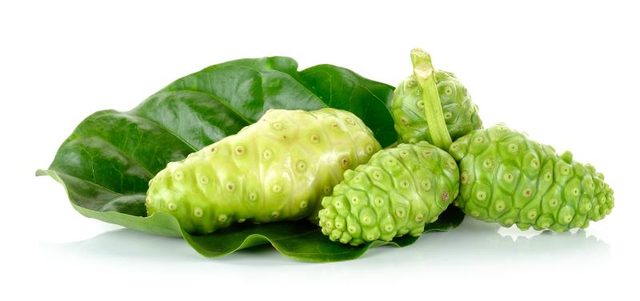What Is Noni Good For?

Noni Overview
The noni plant, or Morinda citrifolia, produces a bitter-tasting fruit that is used to make noni juice. While you can buy 100 percent pure noni juice, it's often mixed with other types of fruit juices. Extracts from the fruit and leaves are used to produce supplements. Noni has been touted to treat a long list of medical conditions, but studies to date do not support its effectiveness for any of them, according to NYU Langone Medical Center. Noni may cause liver damage, so don't take it if you have liver disease. You also should not consume noni if you have kidney disease or you take water pills or blood-thinning medications.
Varying Amounts of Vitamin C
Pure noni juice contains about 53 milligrams of vitamin C per 3.4 ounces, according to “Noni: The Complete Guide for Consumers and Growers.” While this amount provides 71 percent of women's and 59 percent of men's recommended dietary allowance, the actual amount you'll get in noni juice varies from one product to the next. One brand of 100 percent pure noni juice reports that 2 tablespoons provide 2 percent of the daily value of vitamin C. Another brand’s label shows 1 tablespoon has 28 percent of the daily value. If you buy noni juice mixed with other fruit juices, the vitamin C content of these juices will increase or decrease the total amount per serving.
Good Source of Potassium
Potassium regulates your heartbeat, keeps muscles working and offsets the impact of sodium by lowering blood pressure. Noni is a good source of potassium: You'll get 390 to 555 milligrams in a 6-ounce serving of pure juice, according to “Noni: The Complete Guide for Consumers and Growers.” This amount provides 8 to 12 percent of your recommended daily intake. If you have kidney disease and follow a low-potassium diet, you should not consume noni products. Consult your physician before taking noni if you take medications to treat high blood pressure because the two combined may cause high levels of potassium in your blood.
Potential Cancer-Fighting Properties
Laboratory studies show noni may have anti-cancer properties, but more research is needed to prove its effectiveness and safety in people. Compounds extracted from the noni root inhibited the growth of cancer cells in the lab, and mice with tumors survived longer when treated with noni substances, reports the American Cancer Society. Concentrated noni extract, but not pure noni juice, helped stimulate the immune system and killed a small percentage of cancer cells, according to a review in the October 2012 issue of “Phytotherapy Research.” Noni also triggered the death of cervical cancer cells when tested in the lab, according to the January 2013 issue of the “Asian Pacific Journal of Cancer Prevention.”





